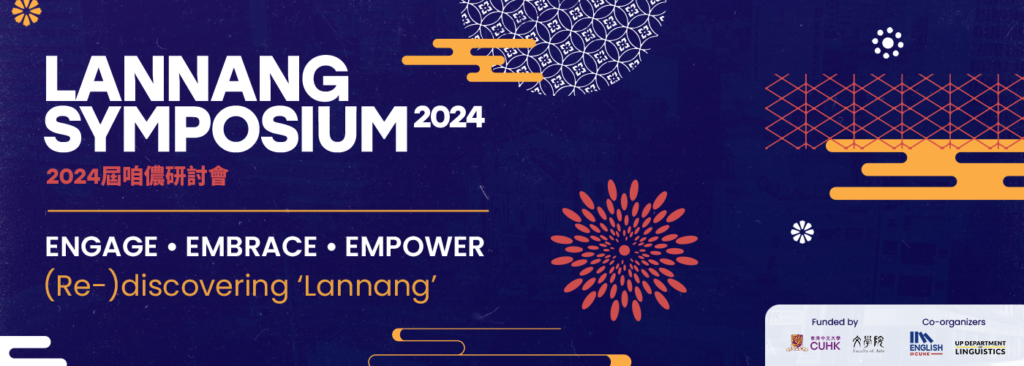Lannang Symposium 2024
- Date: 10 Jul 2024 | 12:00 AM - 11:59 PM
LANNANG SYMPOSIUM 2024
10-12 July 2024 | UP Diliman, Quezon City
Co-organized with The Chinese University of Hong Kong
The Lannang Symposium is a space for Lannang community members, stakeholders, and individuals interested in Lannang heritage to engage in discussions concerning Lannang heritage and identity, with a particular emphasis on language. While the symposium will feature two presentations in a manner similar to academic conferences, it diverges from the conventional conference format in other all other aspects. It adopts a grassroots approach, centering around community-focused activities and discussions. Recognizing that real and sustainable transformations require time, the primary objective of the symposium is modest yet essential. It aims to initiate much-needed conversations and facilitate genuine grassroots activities that are expected to gradually generate positive changes and have an impact within the Lannang community. The symposium seeks to mobilize change at the community level, understanding that authentic and lasting progress begins from within.
The current symposium’s theme, “Engage, Embrace, Empower: (Re-)discovering ‘Lannang’,” was inspired by interviews conducted with 130 Lannang participants between 2017 and 2022 (Gonzales 2022). These interviews revolved around the discussion of Lannang heritage, revealing that participants held varying perceptions of Lannang-ness. Some considered it a broad Chinese identity, while others viewed it as a unique Filipino-Chinese Hokkien identity. Similar parallels were observed in the context of language, where Lánnang-uè was sometimes regarded as a generic Chinese language, while others saw it as a “pure” Hokkien dialect or a blend of Hokkien, Tagalog, and English.
During these interviews, a recurring theme emerged regarding the perceived decline or erosion/attrition of Lannang identity and languages. Despite the different perceptions of Lannang and Lánnang-uè, participants generally agreed that Lannang heritage and languages were gradually diminishing in presence within Filipino society. Another theme that surfaced was a sense of resignation and the belief that individuals lacked the ability or agency to shape the trajectory of Lannang heritage and languages. Some participants felt that other heritages were exerting influence over Lannang heritage and believed that little practical action could be taken to preserve these heritage and languages.
As a result of these discussions, several crucial questions were raised: What does it truly mean to be Lannang? How does Lannang identity and heritage intersect with other identities and heritages in the Philippines? Is the use of ‘Lannang’ and Lannang languages appropriate and inclusive, or does it exclude certain groups? Can Lannang identity and heritage be redefined and renegotiated? Is this a path that Lannang communities are willing to embrace? If so, what concrete steps can be collectively taken to revitalize, reconstruct, or redefine Lannang-ness? In the face of ongoing marginalization, both systemic and otherwise, how can the Lannang communities be empowered? And what role does language play in all of this?
These thought-provoking questions served as the inspiration for the inaugural Lannang Symposium (July 10 to 12, 2024 @ Manila, Philippines). The event aims to initiate discussions on these topics, setting the groundwork for positive transformation within and beyond the Lannang communities. This year, the symposium will feature six discussion topics, each led by community members and influencers.
- Lannangs and language
- Lannangs, language, and media
- Lannangs, language, and religion
- Lannangs, language, and literacy/education/policy
- Lannang culture, heritage, and identity
- Lannang heritage beyond the Manila context
The Symposium will feature the following grassroots activities that celebrate Lannang-ness and empower the community through language:
- Lannang Stories and Experiences (Grassroots stories from the community)
- Lánnang-uè in Film and Song: Dubbing
- Learning Lannang Languages (Lánnang-uè as Deep Hokkien)
- Learning Lannang Languages (Lánnang-uè as Light/Casual Hokkien)
- Lannang in Daily Life Simulation
- Lánnang-uè in Games
- Lannangs, Art, and Literature

